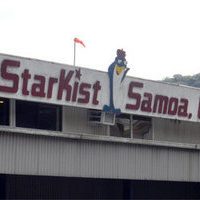
Court proceedings in the federal price fixing case against StarKist and other major tuna producers reveal that the company has put a planned $77 million expansion of its plant in American Samoa, as a consequence of its pending fine.
In a June 12 hearing to discuss StarKist’s fine for pleading guilty to fixing the prices of canned tuna it sold in the United States between 2011 and 2013, StarKist counsel Niall Lynch acknowledged the company did not have the money to commit to expanding production of pouched tuna products in American Samoa.
“The company has already decided that it probably can’t go forward with its plant expansion in American Samoa because it doesn’t have the money,” he said.
StarKist has been pushing for a reduced fine of $50 million while representatives of the U.S. Department of Justice’s Antitrust Division argue the company can afford to pay a $100 million fine.
U.S. District Court Judge Edward M. Chen will resume hearings on the matter in August, after the two sides sparred for hours over the state of StarKist’s finances without coming to a compromise.
The details of that conversation, released in a court transcript June 18, reveal a mixed picture of the company’s financial situation. StarKist appears to be paying down its debt – it had $290 million worth of debt in 2011 but that figure was reduced by $140 million in 2018.
Its outstanding debt appears to be composed entirely of a $150 million loan it renegotiated with a consortium of lenders led by South Korea-based KEB Hana Bank in October 2018. In its projections – barring changes caused by the imposition of the criminal fine – the company expected to lower its total debt to $50 million by 2024.
In addition to its core holdings, the company also holds investments in Indian packaging technology firm TechPack, valued at $155 million, and in Silver Bay Seafoods, a salmon supplier based in Seattle, Washington, worth an estimated $12 million.
The TechPack holding became a central piece of the argument presented by the DOJ in the June 12 hearing, as its estimated worth exceeds the highest possible fine StarKist could receive in the case. That led Judge Chen to order StarKist to explore a sale of its holding in TechPack.
“Everything I have seen is that this is a desirable, a smart, perhaps, and a good investment, but not one that is essential to the continued existence of StarKist,” stated Judge Chen.
“The burden of proof would be on StarKist to demonstrate that that consent could not be obtained. And given the fact that this is a guaranteed loan – loan – guaranteed by the parent [Dongwon Industries], I don’t see any evidence in that regard.”
“So I’m having trouble seeing how the Defendant has met its burden of proof with respect to Techpack, to show that either its simply not salable or not salable for even a fraction of its value but enough to produce enough cash flow, that the bank would – it would be impossible to get the loan.”





